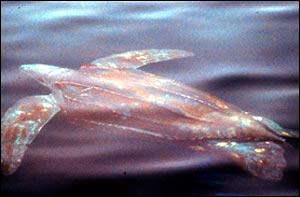|
Leatherbacks extinct in 30 years
17th February 2003
Leatherback turtles swim great distances
By Richard Black
BBC science correspondent in Denver
BBC Denver 2003
Leatherback turtles, the largest turtles in the world, will be extinct within a few decades if current fishing practices continue.
That is the conclusion of marine researchers speaking at the annual meeting of the American Association for the Advancement of Science in Denver.
"We've done specific analysis on beaches where we've got a lot of data and we expect them to disappear in 10 to 30 years," said Larry Crowder, from Duke University, North Carolina.
Scientists say only new international fishing agreements can save the animal.
Accidental death
Leatherbacks are spectacular creatures - two to three metres long, covered in a leathery shell, and able to dive almost a kilometre below the ocean's surface in search of food.
“It outlived the dinosaurs; at the moment it is having trouble outliving us”
Professor Larry Crowder
Poaching of their eggs has driven numbers down but it is the fishing for tuna and swordfish which represent the biggest threat.
"These animals have declined more than 90% in the last 20 years, and one of the major factors we think is critically important now is bycatch - unintended catch - in long line fisheries," Professor Crowder told the BBC.
Some boats trail lines up to 60 kilometres in length, each carrying thousands of hooks.
Professor Crowder has calculated that globally, each day, there are around four million hooks in the world's oceans fishing for tuna and swordfish.
Hook shapes
Turtles will eat the bait and get caught on the hooks, or simply get entangled in the lines.
Because the range of leatherbacks is so great, national legislation on long lines will not be sufficient to save the animals.
"If you tag one with a satellite tag in Monterey bay, it will shoot straight across to Indonesia," Professor Crowder explained.
"They are the most widely distributed sea turtle. They swim from 50 degrees south to 50 degrees north. Trying to regulate their interactions with fisheries out in international waters is really difficult."
Professor Crowder told delegates that there was much that could be done to minimise the impact of long line fishing, such as changing the shape of hooks.
"This organism has been around for 100 million years. It outlived the dinosaurs; at the moment it is having trouble outliving us."
Please see the associated BBC News items listed below:
19th August 2001~ Science/Nature Technology hope for turtles
29th June 2001 ~ Science/Nature International turtle rescue plan drawn up
10th August 2000 ~ Sci/Tech Vanishing reptiles prompt concern
20th July 2000 ~ Africa Saving the giant sea turtle
Top
|

